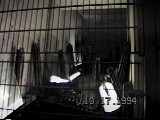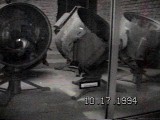
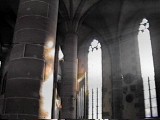
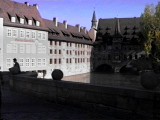
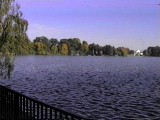




Nurnberg is an awesome place for romantics who find history facinating.
My earliest academic writing achievement involved consulting my new 1958
set of the Encyclopedia (yes, I did learn the spelling from Jiminy Cricket!)
 Americana on the "Nuremberg Trials" --a topic suggested by my father who paid
big bucks that he didn't have after a clean-cut college student salesman
came to our humble door in Colorado Springs, Colorado and left hours later
Americana on the "Nuremberg Trials" --a topic suggested by my father who paid
big bucks that he didn't have after a clean-cut college student salesman
came to our humble door in Colorado Springs, Colorado and left hours later
with my mother's wonderful Sunday dinner in his stomach and a down-payment
check in his pocket. I was not a great student but the acquisition of
this resource did improve my performance in those grey, pre-Camelot days
when Hoppalong Cassidy, the Cisco Kid, and Wyatt Earp
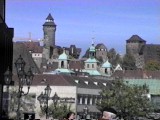 competed with Annette Funicello and Penny for my attention, John Cameron
Swazy gave daily reports on General
and President Eisenhower, "I Led Three Lives" showed how rotten
the Reds were, "The Big Picture" showed General Patton steamrolling the
Wehrmacht, "Victory At Sea" showed Marines raising the flag on Iwo Jima
competed with Annette Funicello and Penny for my attention, John Cameron
Swazy gave daily reports on General
and President Eisenhower, "I Led Three Lives" showed how rotten
the Reds were, "The Big Picture" showed General Patton steamrolling the
Wehrmacht, "Victory At Sea" showed Marines raising the flag on Iwo Jima
to the strains of Richard Rodgers stunning score, and patriot heros such as my father were
still showing visitors their bemedaled "Ike" jackets.
In fact, my father had participated in the battle for Nurnberg where
millions of doomed Nazis lined up in the 30s to hear "Der Chef" scream in terms that
even Wagner would have thought too romantic. And here I was at last walking in
the footsteps of the Meistersingers, trying to cross the four-lane road to the old city
 by dodging hundreds of speeding autos and motorcycles! I was very impressed by
the reconstruction of the city and somewhat uncomfortable at the thought of the
bombing which killed thousands of civilians--especially when the people at the Hotel Marienbad
and the various restaurants, shops and passersby were so damned nice to us.
I really don't know what I expected in this regard--hostility, resentment, phiosophical acceptance
I do know that Nurnberg was a chillingly facinating place to ponder history. An overpowering karma!
by dodging hundreds of speeding autos and motorcycles! I was very impressed by
the reconstruction of the city and somewhat uncomfortable at the thought of the
bombing which killed thousands of civilians--especially when the people at the Hotel Marienbad
and the various restaurants, shops and passersby were so damned nice to us.
I really don't know what I expected in this regard--hostility, resentment, phiosophical acceptance
I do know that Nurnberg was a chillingly facinating place to ponder history. An overpowering karma!
We had coffee with a very nice elderly lady at a Konditori near the wunderbar Christkindlesmarkt. Her only complaint was about the increasing number of "creeps" showing up in
her city. And, it did appear that Nurnberg was the most "German" city we went to (our hotel room had its own frig stocked with cold beer--consumed on the honor system) and the
safest "feeling" (our only uncomfortable time came in the Bahnhof as we tried to help, by
 answering questions from, two very drunken Auslanders who seemed to become abusive in
their responses to our inability to communicate in whatever language they were
speaking).
answering questions from, two very drunken Auslanders who seemed to become abusive in
their responses to our inability to communicate in whatever language they were
speaking).
It was a cold, windy day but the sky was clear,
blue and sunny as we left the bus at the Volkspark. Beverly had been there before and was sure she could find the site we were looking for. The driver said just
walk straight ahead. It took some imagination to see the remains of the
huge stadium used for mass Nazi rallies in the 30s. The only recognizable
structure was the marble war memorial and plaza. We then crossed the street to
 the congresshall. Its roofless, unfinished interior currently used to garage garbage trucks
and other municipal vehicles. Very interesting but not our main target.
Then, a middle-aged man on his 10-speed bike stopped and said "you want to
see Heetlahr!" and pointed in a certain direction. We said "Danke" and began
walking. The sight from the Congresshall was for me probably the most ethereal
the congresshall. Its roofless, unfinished interior currently used to garage garbage trucks
and other municipal vehicles. Very interesting but not our main target.
Then, a middle-aged man on his 10-speed bike stopped and said "you want to
see Heetlahr!" and pointed in a certain direction. We said "Danke" and began
walking. The sight from the Congresshall was for me probably the most ethereal
sight in all Europa: The bone-white glimmer of the Zeppelin Field gallery
emerging from and reflecting across the dark blue water of the Große
Dutzendteich. It was October and the colorful, changing leaves against the light blue sky
provided an eerily appropriate frame as we walked around the lake to the site.
The scene lost some of its mystique up close: this gleaming monument from which
Hitler addressed his followers is now isolated from its field by roads bearing
fast moving traffic; tennis players now use its monumental walls as backdrops, and its
teutonic interior houses a hollocaust museum.

